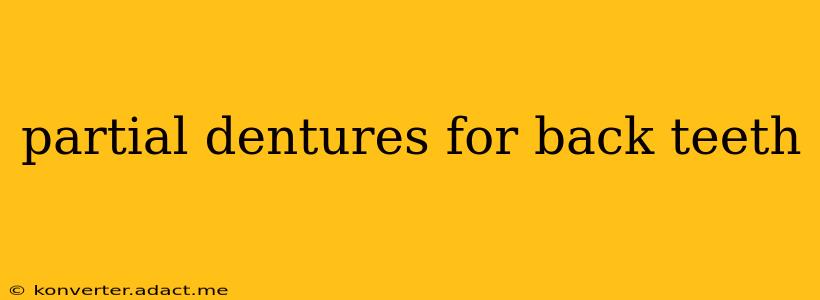Losing back teeth can significantly impact your ability to chew food properly, your speech, and even your self-confidence. Fortunately, partial dentures offer a reliable solution to restore function and aesthetics. This guide explores partial dentures specifically designed for replacing missing back teeth, addressing common questions and concerns.
What are Partial Dentures?
Partial dentures are removable prosthetic devices used to replace missing teeth. Unlike full dentures, which replace an entire arch of teeth, partial dentures fill in gaps where individual teeth or groups of teeth are absent. They are typically made from a combination of acrylic resin (for the pink gum-colored base) and metal frameworks or flexible materials for strength and stability. The artificial teeth are attached to this framework, seamlessly integrating with your remaining natural teeth.
Types of Partial Dentures for Back Teeth
Several types of partial dentures can address back tooth loss:
-
Conventional Partial Dentures: These are the most common type, featuring a metal framework that clasps onto your existing teeth for support and stability. They are durable and effective, especially for replacing multiple missing back teeth.
-
Flexible Partial Dentures: Made from a more flexible material like nylon or Valplast, these dentures are often preferred for their comfort and less noticeable appearance. They're a good option for those who want a lightweight, discreet solution. However, their durability may be less than that of conventional metal-based dentures.
-
Implant-Supported Partial Dentures: For enhanced stability and support, especially crucial when many back teeth are missing, implant-supported partial dentures can be an excellent option. Dental implants are surgically placed into the jawbone, providing a secure foundation for the denture to attach to. This offers superior retention and chewing ability compared to traditional partial dentures.
What are the Benefits of Partial Dentures for Back Teeth?
Replacing missing back teeth with partial dentures offers numerous advantages:
-
Improved Chewing and Digestion: Back teeth are essential for proper chewing and breaking down food. Partial dentures restore this function, improving digestion and overall health.
-
Enhanced Speech: Missing back teeth can affect pronunciation and speech clarity. Partial dentures help restore proper articulation.
-
Improved Facial Structure: Tooth loss can lead to a sunken appearance in the face. Partial dentures help maintain facial structure and prevent further bone loss.
-
Increased Self-Confidence: Restoring a natural smile can significantly boost self-esteem and confidence.
How are Partial Dentures for Back Teeth Made?
The process typically involves several appointments:
-
Initial Consultation: Your dentist will assess your mouth, examine the missing teeth, and discuss your treatment options.
-
Impressions and Models: Accurate impressions (molds) of your mouth will be taken to create a model of your teeth and gums.
-
Framework Fabrication: A custom framework will be created, often using metal, to fit precisely within your mouth.
-
Teeth Placement and Adjustment: Artificial teeth are carefully selected and attached to the framework. Multiple adjustments may be needed to ensure proper fit and comfort.
-
Final Fitting and Instructions: Once the denture fits comfortably and functions correctly, you'll receive instructions on proper care and maintenance.
How Long Do Partial Dentures for Back Teeth Last?
With proper care, partial dentures can last for several years, sometimes even a decade or more. Regular dental check-ups and cleanings are crucial for maintaining their longevity.
How Much Do Partial Dentures for Back Teeth Cost?
The cost of partial dentures varies significantly depending on the type of denture, materials used, and the complexity of the case. It's best to consult with your dentist for a personalized cost estimate.
What is the Aftercare for Partial Dentures?
Proper aftercare is vital for the longevity of your partial dentures:
-
Regular Cleaning: Clean your dentures daily with a soft-bristled brush and denture cleaner.
-
Soaking: Soak your dentures overnight in a cleaning solution.
-
Professional Cleanings: Schedule regular check-ups and professional cleanings with your dentist.
-
Gentle Handling: Handle your dentures carefully to avoid breakage.
Are there Alternatives to Partial Dentures for Back Teeth?
Yes, alternatives include dental implants, bridges, or nothing at all. The best option depends on your individual circumstances, budget, and overall oral health. Discuss these alternatives with your dentist to determine the most suitable solution for your needs.
Can I Eat Anything with Partial Dentures?
Initially, you may need to adjust your diet to avoid overly hard or sticky foods. As you become accustomed to your dentures, you should be able to eat most foods with little restriction. However, it's always advisable to practice caution and avoid excessively hard or crunchy foods to prevent damage to the dentures or your natural teeth.
This comprehensive guide provides valuable information on partial dentures for back teeth. However, remember that this information is for educational purposes only and does not substitute professional dental advice. Always consult with a qualified dentist to determine the best treatment plan for your specific needs.
